Verbal Perceptual Prompts Facilitate Children’s Sensitivity to False Beliefs
Abstract
1. Introduction
1.1. The Development of Theory of Mind: Two Systems
1.2. The Failed Replication of Sensitivity to False Beliefs
1.3. The Verbal Prompts and Sensitivity to False Beliefs
1.4. The Present Study
2. Materials and Methods
2.1. Participants
2.2. Apparatus
2.3. Stimuli
2.4. Design and Procedure
2.5. Coding
3. Results
3.1. DLS
3.2. Proportion of First Looks at the Empty Position
3.3. Proportion of Verbal Answers to the Empty Position
3.4. Proportion of Response Patterns
4. Discussion
4.1. The Role of Verbal Perceptual Prompts
4.2. The Manifestation of Children’s Sensitivity to False Beliefs
4.3. Limitation and Future Directions
4.4. Implications
Author Contributions
Funding
Institutional Review Board Statement
Informed Consent Statement
Data Availability Statement
Acknowledgments
Conflicts of Interest
References
- Apperly, Ian A., and Stephen A. Butterfill. 2009. Do Humans Have Two Systems to Track Beliefs and Belief-Like States? Psychological Review 116: 953–70. [Google Scholar] [CrossRef] [PubMed]
- Baillargeon, Renée, David Buttelmann, and Victoria Southgate. 2018. Invited Commentary: Interpreting failed replications of early false-belief findings: Methodological and theoretical considerations. Cognitive Development 46: 112–24. [Google Scholar] [CrossRef]
- Baillargeon, Renée, Rose M. Scott, and Zijing He. 2010. False-belief understanding in infants. Trends in Cognitive Sciences 14: 110–18. [Google Scholar] [CrossRef] [PubMed]
- Bardi, Lara, Charlotte Desmet, Annabel Nijhof, Jan R. Wiersema, and Marcel Brass. 2017. Brain activation for spontaneous and explicit false belief tasks overlaps: New fMRI evidence on belief processing and violation of expectation. Social Cognitive and Affective Neuroscience 12: 391–400. [Google Scholar] [CrossRef] [PubMed]
- Barone, Pamela, and Antoni Gomila. 2021. Infants’ performance in the indirect false belief tasks: A second-person interpretation. WIREs Cognitive Science 12: e1551. [Google Scholar] [CrossRef]
- Barone, Pamela, Guido Corradi, and Antoni Gomila. 2019. Infants’ performance in spontaneous-response false belief tasks: A review and meta-analysis. Infant Behavior and Development 57: 101350. [Google Scholar] [CrossRef] [PubMed]
- Barrett, H. Clark, Tanya Broesch, Rose M. Scott, Zijing He, Renée Baillargeon, Di Wu, Matthias Bolz, Joseph Henrich, Peipei Setoh, Jianxin Wang, and et al. 2013. Early false-belief understanding in traditional non-Western societies. Proceedings of the Royal Society B: Biological Sciences 280: 20122654. [Google Scholar] [CrossRef] [PubMed]
- Biervoye, Aurelie, Laurence Dricot, Adrian Ivanoiu, and Dana Samson. 2016. Impaired spontaneous belief inference following acquired damage to the left posterior temporoparietal junction. Social Cognitive and Affective Neuroscience 11: 1513–20. [Google Scholar] [CrossRef] [PubMed]
- Boccadoro, Sara, Emiel Cracco, Anna R. Hudson, Lara Bardi, Annabel D. Nijhof, Jan R. Wiersema, Marcel Brass, and Sven C. Mueller. 2019. Defining the neural correlates of spontaneous theory of mind (ToM): An fMRI multi-study investigation. NeuroImage 203: 116193. [Google Scholar] [CrossRef]
- Buttelmann, David, Frances Buttelmann, Malinda Carpenter, Josep Call, and Michael Tomasello. 2017. Great apes distinguish true from false beliefs in an interactive helping task. PLoS ONE 12: e0173793. [Google Scholar] [CrossRef]
- Buttelmann, David, Harriet Over, Malinda Carpenter, and Michael Tomasello. 2014. Eighteen-month-olds understand false beliefs in an unexpected-contents task. Journal of Experimental Child Psychology 119: 120–26. [Google Scholar] [CrossRef] [PubMed]
- Buttelmann, David, Malinda Carpenter, and Michael Tomasello. 2009. Eighteen-month-old infants show false belief understanding in an active helping paradigm. Cognition 112: 337–42. [Google Scholar] [CrossRef] [PubMed]
- Buttelmann, Frances, Janina Suhrke, and David Buttelmann. 2015. What you get is what you believe: Eighteen-month-olds demonstrate belief understanding in an unexpected-identity task. Journal of Experimental Child Psychology 131: 94–103. [Google Scholar] [CrossRef] [PubMed]
- Butterfill, Stephen A., and Ian A. Apperly. 2013. How to Construct a Minimal Theory of Mind. Mind & Language 28: 606–37. [Google Scholar] [CrossRef]
- Clements, Wendy A., and Josef Perner. 1994. Implicit understanding of belief. Cognitive Development 9: 377–95. [Google Scholar] [CrossRef]
- Dörrenberg, Sebastian, Hannes Rakoczy, and Ulf Liszkowski. 2018. How (not) to measure infant Theory of Mind: Testing the replicability and validity of four non-verbal measures. Cognitive Development 46: 12–30. [Google Scholar] [CrossRef]
- Frith, Chris D., and Uta Frith. 2006. The Neural Basis of Mentalizing. Neuron 50: 531–34. [Google Scholar] [CrossRef] [PubMed]
- German, Tamsin C., and Adam S. Cohen. 2012. A cue-based approach to ‘theory of mind’: Re-examining the notion of automaticity. British Journal of Developmental Psychology 30: 45–58. [Google Scholar] [CrossRef] [PubMed]
- Grosse Wiesmann, Charlotte, Angela D. Friederici, Tania Singer, and Nikolaus Steinbeis. 2017. Implicit and explicit false belief development in preschool children. Developmental Science 20: e12445. [Google Scholar] [CrossRef]
- Hansen, Mikkel. 2010. If you know something, say something: Young children’s problem with false beliefs. Frontiers in Psychology 1: 23. [Google Scholar] [CrossRef]
- Hayashi, Taketsugu, Ryota Akikawa, Keisuke Kawasaki, Jun Egawa, Takafumi Minamimoto, Kazuto Kobayashi, Shigeki Kato, Yukiko Hori, Yuji Nagai, Atsuhiko Iijima, and et al. 2020. Macaques Exhibit Implicit Gaze Bias Anticipating Others’ False-Belief-Driven Actions via Medial Prefrontal Cortex. Cell Reports 30: 4433–44.e5. [Google Scholar] [CrossRef] [PubMed]
- He, Zijing, Matthias Bolz, and Renée Baillargeon. 2012. 2.5-year-olds succeed at a verbal anticipatory-looking false-belief task. British Journal of Developmental Psychology 30: 14–29. [Google Scholar] [CrossRef] [PubMed]
- Hyde, Daniel C., Mariana Aparicio Betancourt, and Charline E. Simon. 2015. Human Temporal-Parietal Junction Spontaneously Tracks Others’ Beliefs: A Functional Near-Infrared Spectroscopy Study. Human Brain Mapping 36: 4831–46. [Google Scholar] [CrossRef] [PubMed]
- Kaltefleiter, Larissa J., Tobias Schuwerk, Charlotte Grosse Wiesmann, Susanne Kristen-Antonow, Irina Jarvers, and Beate Sodian. 2022. Evidence for goal- and mixed evidence for false belief-based action prediction in 2- to 4-year-old children: A large-scale longitudinal anticipatory looking replication study. Developmental Science 25: e13224. [Google Scholar] [CrossRef] [PubMed]
- Kammermeier, Marina, and Markus Paulus. 2018. Do action-based tasks evidence false-belief understanding in young children? Cognitive Development 46: 31–39. [Google Scholar] [CrossRef]
- Knudsen, Birgit, and Ulf Liszkowski. 2012a. 18-Month-Olds Predict Specific Action Mistakes Through Attribution of False Belief, Not Ignorance, and Intervene Accordingly. Infancy 17: 672–91. [Google Scholar] [CrossRef] [PubMed]
- Knudsen, Birgit, and Ulf Liszkowski. 2012b. Eighteen- and 24-month-old infants correct others in anticipation of action mistakes. Developmental Science 15: 113–22. [Google Scholar] [CrossRef] [PubMed]
- Kristen-Antonow, Susanne, Irina Jarvers, and Beate Sodian. 2019. Preschoolers’ Developing Understanding of Factivity in Mental Verb Comprehension and Its Relation to First- and Second-Order False Belief Understanding: A Longitudinal Study. Journal of Cognition and Development 20: 354–69. [Google Scholar] [CrossRef]
- Krupenye, Christopher, Fumihiro Kano, Satoshi Hirata, Josep Call, and Michael Tomasello. 2016. Great apes anticipate that other individuals will act according to false beliefs. Science 354: 110–14. [Google Scholar] [CrossRef]
- Kulke, Louisa, and Hannes Rakoczy. 2019. Testing the Role of Verbal Narration in Implicit Theory of Mind Tasks. Journal of Cognition and Development 20: 1–14. [Google Scholar] [CrossRef]
- Kulke, Louisa, Josefin Johannsen, and Hannes Rakoczy. 2019. Why can some implicit Theory of Mind tasks be replicated and others cannot? A test of mentalizing versus submentalizing accounts. PLoS ONE 14: e0213772. [Google Scholar] [CrossRef]
- Lonardo, Lucrezia, Christoph J. Völter, Claus Lamm, and Ludwig Huber. 2021. Dogs follow human misleading suggestions more often when the informant has a false belief. Proceedings of the Royal Society B: Biological Sciences 288: 20210906. [Google Scholar] [CrossRef] [PubMed]
- Low, Jason, and Josef Perner. 2012. Implicit and explicit theory of mind: State of the art. British Journal of Developmental Psychology 30: 1–13. [Google Scholar] [CrossRef] [PubMed]
- Meristo, Marek, Gary Morgan, Alessandra Geraci, Laura Iozzi, Erland Hjelmquist, Luca Surian, and Michael Siegal. 2012. Belief attribution in deaf and hearing infants. Developmental Science 15: 633–40. [Google Scholar] [CrossRef] [PubMed]
- Naughtin, Claire K., Kristina Horne, Dana Schneider, Dustin Venini, Ashley York, and Paul E. Dux. 2017. Do Implicit and Explicit Belief Processing Share Neural Substrates? Human Brain Mapping 38: 4760–72. [Google Scholar] [CrossRef] [PubMed]
- Newen, Albert, and Julia Wolf. 2020. The Situational Mental File Account of the False Belief Tasks: A New Solution of the Paradox of False Belief Understanding. Review of Philosophy and Psychology 11: 717–44. [Google Scholar] [CrossRef]
- Nijhof, Annabel D., Lara Bardi, Marcel Brass, and Jan R. Wiersema. 2018. Brain activity for spontaneous and explicit mentalizing in adults with autism spectrum disorder: An fMRI study. Neuroimage-Clinical 18: 475–84. [Google Scholar] [CrossRef] [PubMed]
- Onishi, Kristine H., and Renée Baillargeon. 2005. Do 15-Month-Old Infants Understand False Beliefs? Science 308: 255–58. [Google Scholar] [CrossRef]
- Poulin-Dubois, Diane, Elizabeth J. Goldman, Alexandra Meltzer, and Elaine Psaradellis. 2023. Discontinuity from implicit to explicit theory of mind from infancy to preschool age. Cognitive Development 65: 101273. [Google Scholar] [CrossRef]
- Powell, Lindsey J., Kathryn Hobbs, Alexandros Bardis, Susan Carey, and Rebecca Saxe. 2018. Replications of implicit theory of mind tasks with varying representational demands. Cognitive Development 46: 40–50. [Google Scholar] [CrossRef]
- Premack, David, and Guy Woodruff. 1978. Does the chimpanzee have a theory of mind? Behavioral and Brain Sciences 1: 515. [Google Scholar] [CrossRef]
- Ruffman, Ted. 2014. To belief or not belief: Children’s theory of mind. Developmental Review 34: 265–93. [Google Scholar] [CrossRef]
- Schneider, Dana, Virginia P. Slaughter, Andrew P. Bayliss, and Paul E. Dux. 2013. A temporally sustained implicit theory of mind deficit in autism spectrum disorders. Cognition 129: 410–17. [Google Scholar] [CrossRef] [PubMed]
- Schuwerk, Tobias, Beate Priewasser, Beate Sodian, and Josef Perner. 2018. The robustness and generalizability of findings on spontaneous false belief sensitivity: A replication attempt. Royal Society Open Science 5: 172273. [Google Scholar] [CrossRef] [PubMed]
- Schuwerk, Tobias, Irina Jarvers, Maria Vuori, and Beate Sodian. 2016. Implicit Mentalizing Persists beyond Early Childhood and Is Profoundly Impaired in Children with Autism Spectrum Condition. Frontiers in Psychology 7: 1696. [Google Scholar] [CrossRef] [PubMed]
- Schuwerk, Tobias, Maria Vuori, and Beate Sodian. 2015. Implicit and explicit Theory of Mind reasoning in autism spectrum disorders: The impact of experience. Autism 19: 459–68. [Google Scholar] [CrossRef]
- Scott, Rose M., and Renée Baillargeon. 2009. Which Penguin Is This? Attributing False Beliefs About Object Identity at 18 Months. Child Development 80: 1172–96. [Google Scholar] [CrossRef] [PubMed]
- Scott, Rose M., Zijing He, Renée Baillargeon, and Denise Cummins. 2012. False-belief understanding in 2.5-year-olds: Evidence from two novel verbal spontaneous-response tasks. Developmental Science 15: 181–93. [Google Scholar] [CrossRef]
- Senju, Atsushi, Victoria Southgate, Charlotte Snape, Mark Leonard, and Gergely Csibra. 2011. Do 18-Month-Olds Really Attribute Mental States to Others? Psychological Science 22: 878–80. [Google Scholar] [CrossRef]
- Senju, Atsushi, Victoria Southgate, Yui Miura, Tomoko Matsui, Toshikazu Hasegawa, Yoshikuni Tojo, Hiroo Osanai, and Gergely Csibra. 2010. Absence of spontaneous action anticipation by false belief attribution in children with autism spectrum disorder. Development and Psychopathology 22: 353–60. [Google Scholar] [CrossRef]
- Siegal, Michael, and Karen Beattie. 1991. Where to look first for children’s knowledge of false beliefs. Cognition 38: 1–12. [Google Scholar] [CrossRef]
- Slaughter, Virginia, and Daniel Perez-Zapata. 2014. Cultural Variations in the Development of Mind Reading. Child Development Perspectives 8: 237–41. [Google Scholar] [CrossRef]
- Song, Hyun-joo, and Renée Baillargeon. 2008. Infants’ reasoning about others’ false perceptions. Developmental Psychology 44: 1789–95. [Google Scholar] [CrossRef] [PubMed]
- Song, Hyun-joo, Kristine H. Onishi, Renée Baillargeon, and Cynthia Fisher. 2008. Can an agent’s false belief be corrected by an appropriate communication? Psychological reasoning in 18-month-old infants. Cognition 109: 295–315. [Google Scholar] [CrossRef]
- Southgate, Victoria, Atsushi Senju, and Gergely Csibra. 2007. Action Anticipation Through Attribution of False Belief by 2-Year-Olds. Psychological Science 18: 587–92. [Google Scholar] [CrossRef] [PubMed]
- Southgate, Victoria, Coralie Chevallier, and Gergely Csibra. 2010. Seventeen-month-olds appeal to false beliefs to interpret others’ referential communication. Developmental Science 13: 907–12. [Google Scholar] [CrossRef] [PubMed]
- Surian, Luca, and Alessandra Geraci. 2012. Where will the triangle look for it? Attributing false beliefs to a geometric shape at 17 months. British Journal of Developmental Psychology 30: 30–44. [Google Scholar] [CrossRef] [PubMed]
- Surian, Luca, Stefania Caldi, and Dan Sperber. 2007. Attribution of Beliefs by 13-Month-Old Infants. Psychological Science 18: 580–86. [Google Scholar] [CrossRef] [PubMed]
- Thoermer, Claudia, Beate Sodian, Maria Vuori, Hannah Perst, and Susanne Kristen. 2012. Continuity from an implicit to an explicit understanding of false belief from infancy to preschool age. British Journal of Developmental Psychology 30: 172–87. [Google Scholar] [CrossRef]
- Tomasello, Michael. 2018. How children come to understand false beliefs: A shared intentionality account. Proceedings of the National Academy of Sciences 115: 8491–98. [Google Scholar] [CrossRef]
- Träuble, Birgit, Vesna Marinović, and Sabina Pauen. 2010. Early Theory of Mind Competencies: Do Infants Understand Others’ Beliefs? Infancy 15: 434–44. [Google Scholar] [CrossRef] [PubMed]
- Wellman, Henry M., David Cross, and Julanne Watson. 2001. Meta-Analysis of Theory-of-Mind Development: The Truth about False Belief. Child Development 72: 655–84. [Google Scholar] [CrossRef] [PubMed]
- Yott, Jessica, and Diane Poulin-Dubois. 2012. Breaking the rules: Do infants have a true understanding of false belief? British Journal of Developmental Psychology 30: 156–71. [Google Scholar] [CrossRef]
- Zhang, Xiaowen, and Peng Zhou. 2021. Linguistic cues facilitate children’s understanding of belief-reporting sentences. First Language 42: 51–80. [Google Scholar] [CrossRef]

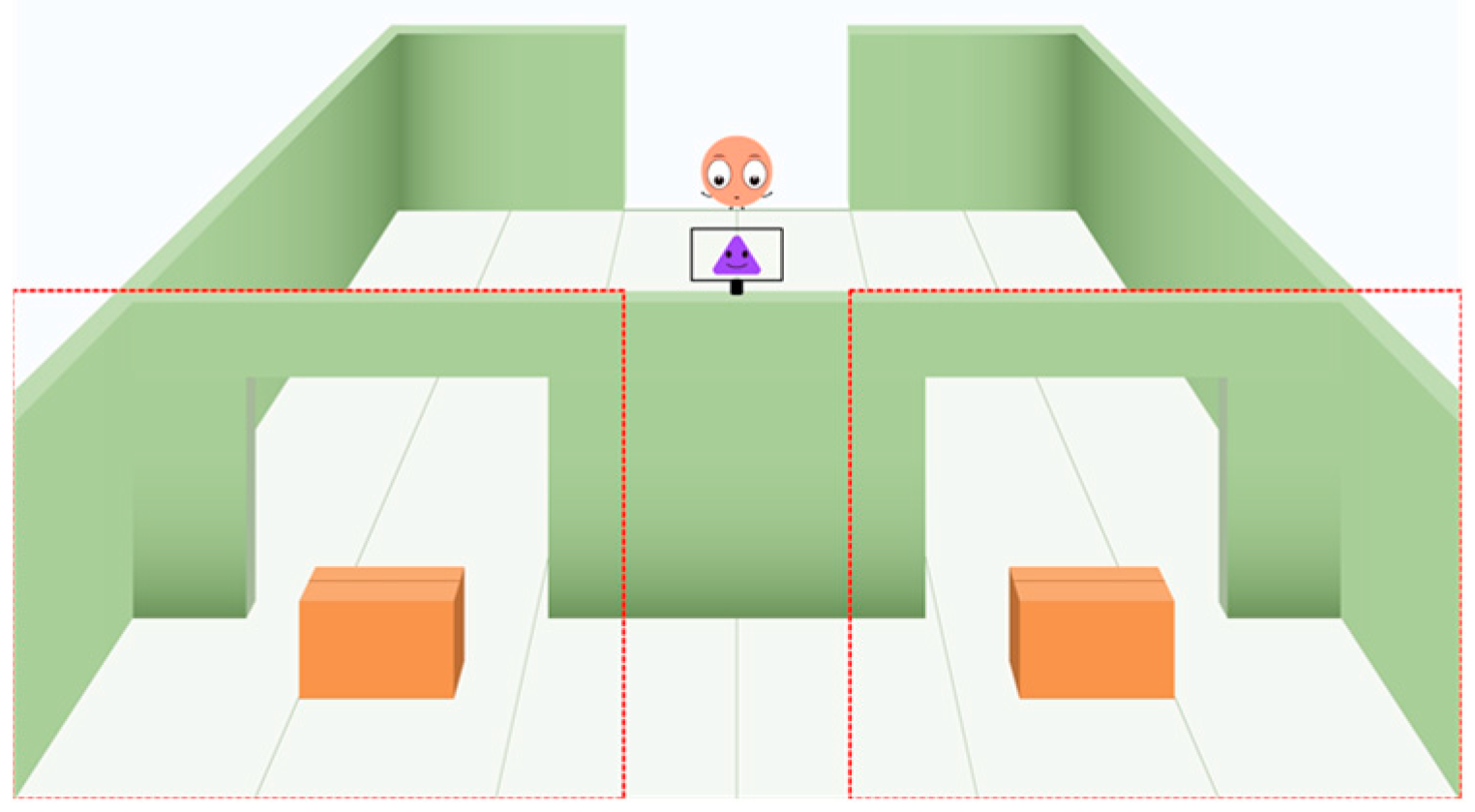
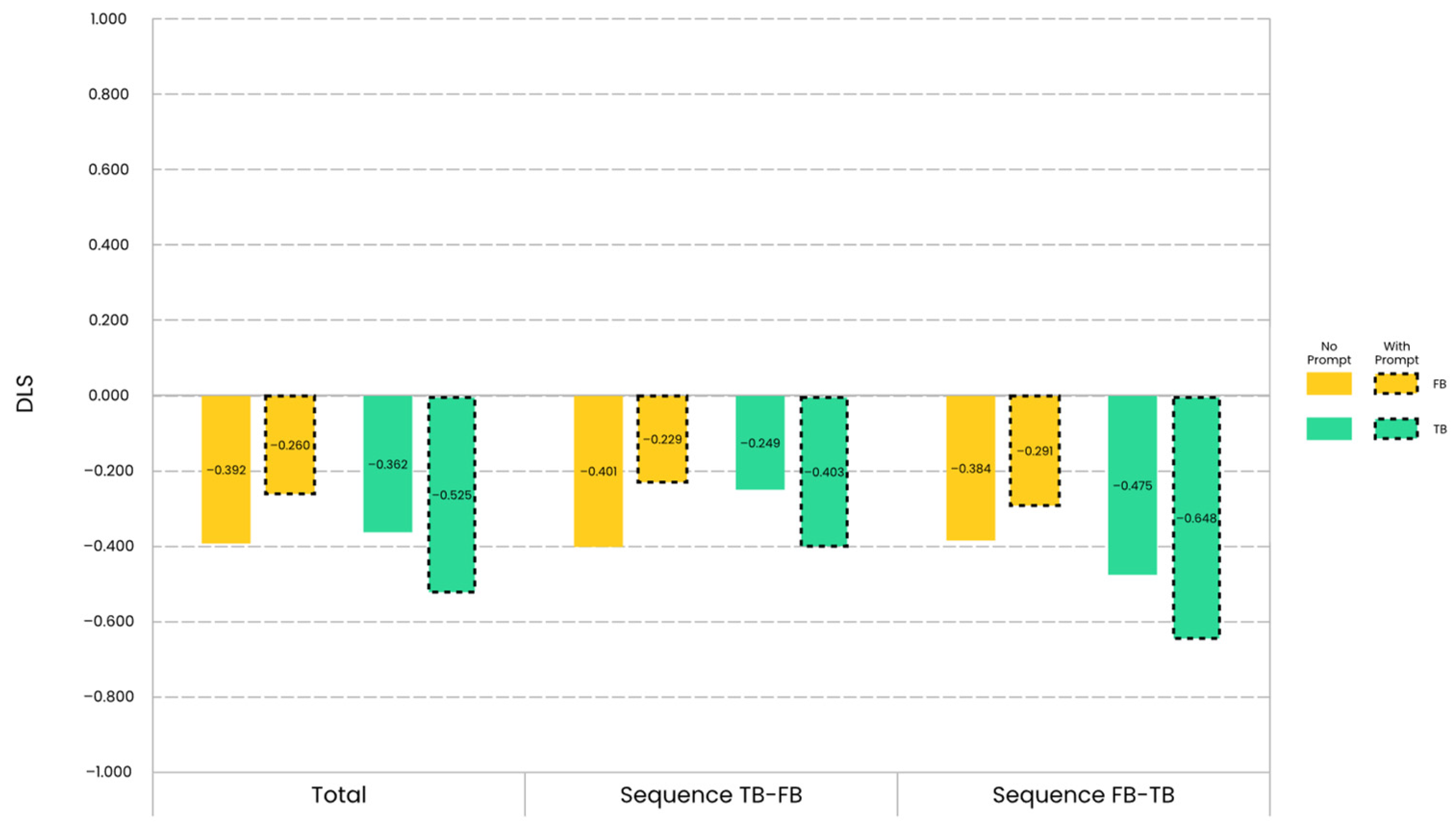
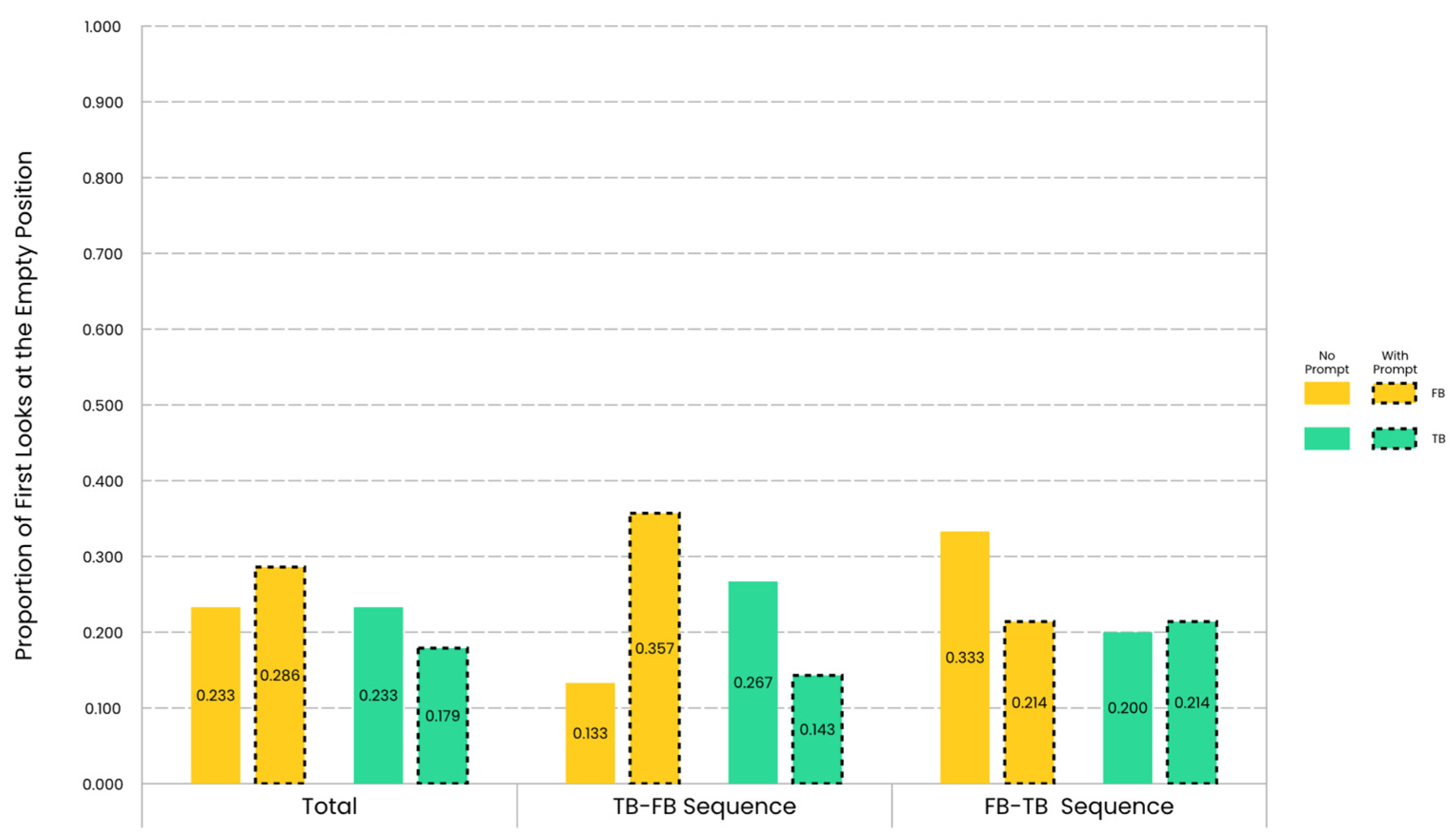
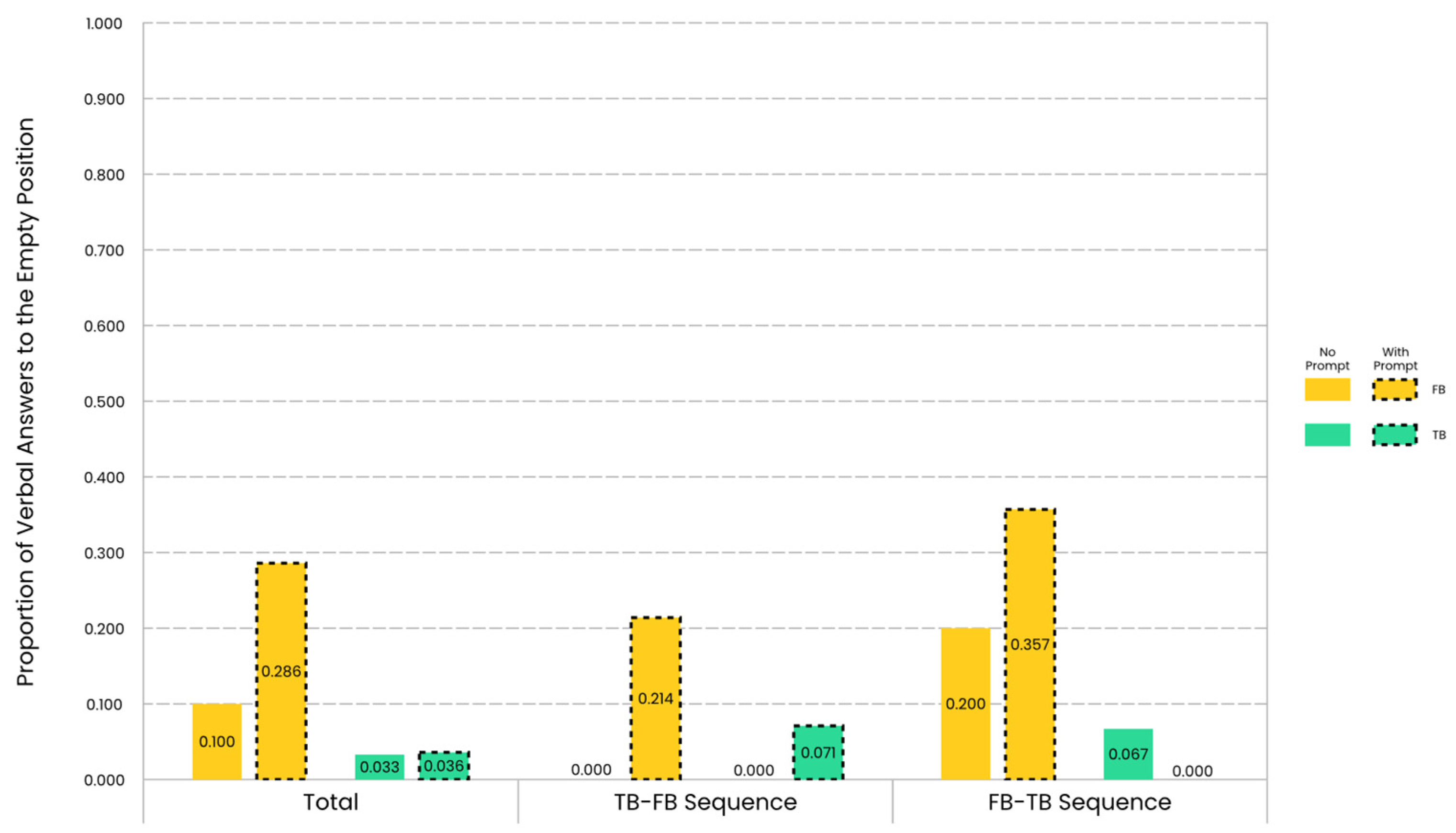
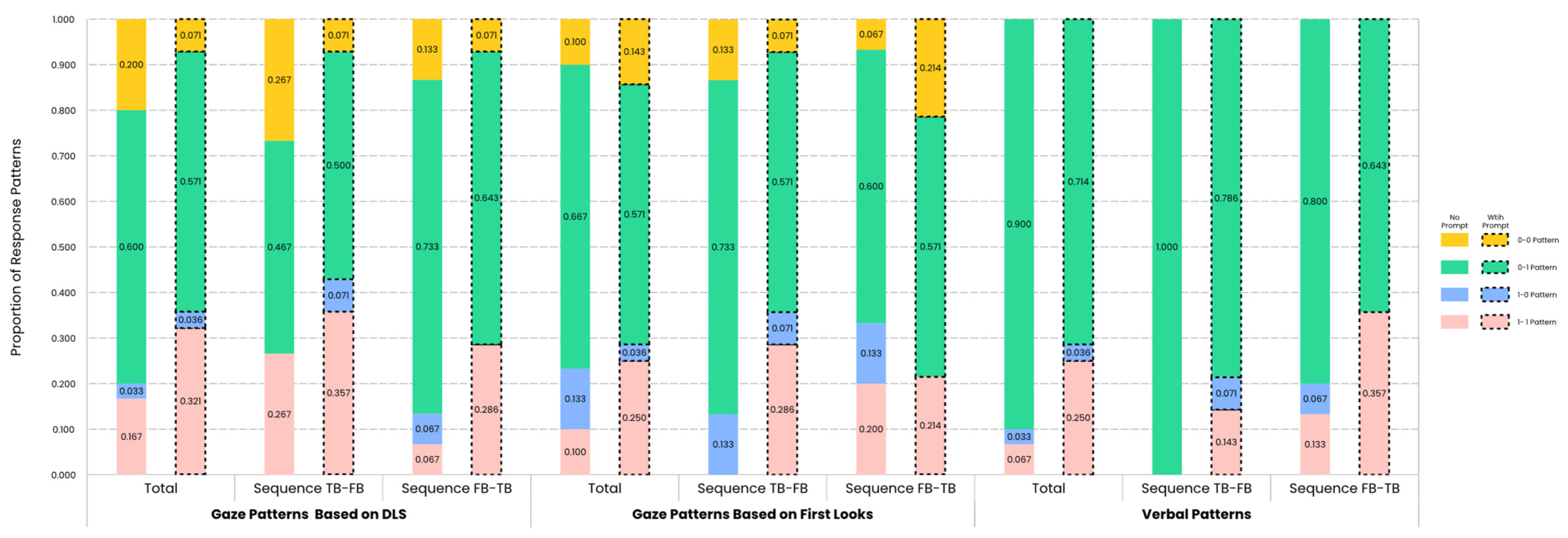
Disclaimer/Publisher’s Note: The statements, opinions and data contained in all publications are solely those of the individual author(s) and contributor(s) and not of MDPI and/or the editor(s). MDPI and/or the editor(s) disclaim responsibility for any injury to people or property resulting from any ideas, methods, instructions or products referred to in the content. |
© 2024 by the authors. Licensee MDPI, Basel, Switzerland. This article is an open access article distributed under the terms and conditions of the Creative Commons Attribution (CC BY) license (https://creativecommons.org/licenses/by/4.0/).
Share and Cite
Huang, Q.; Liu, X. Verbal Perceptual Prompts Facilitate Children’s Sensitivity to False Beliefs. J. Intell. 2024, 12, 73. https://doi.org/10.3390/jintelligence12080073
Huang Q, Liu X. Verbal Perceptual Prompts Facilitate Children’s Sensitivity to False Beliefs. Journal of Intelligence. 2024; 12(8):73. https://doi.org/10.3390/jintelligence12080073
Chicago/Turabian StyleHuang, Qiyu, and Xiuli Liu. 2024. "Verbal Perceptual Prompts Facilitate Children’s Sensitivity to False Beliefs" Journal of Intelligence 12, no. 8: 73. https://doi.org/10.3390/jintelligence12080073
APA StyleHuang, Q., & Liu, X. (2024). Verbal Perceptual Prompts Facilitate Children’s Sensitivity to False Beliefs. Journal of Intelligence, 12(8), 73. https://doi.org/10.3390/jintelligence12080073



